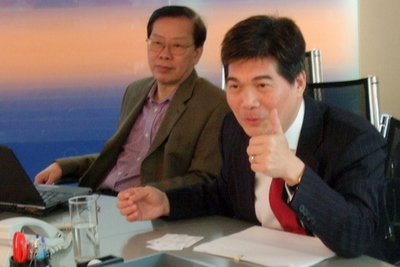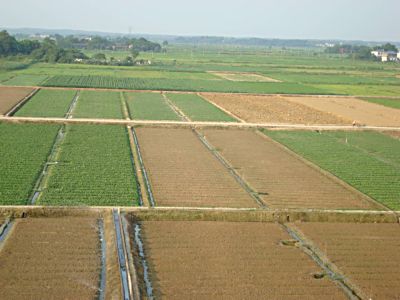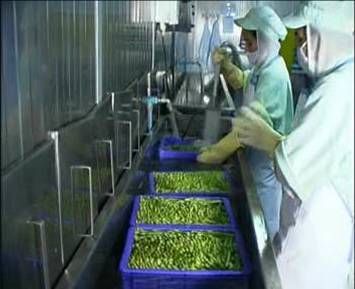
HENG TAI Consumables Group Ltd is no ordinary player in the food industry. Over the past decade, the company has transformed itself, moving up the production chain, chasing along with it healthy profits and pricing maneuverability.
Heng Tai’s CEO Mr. Chu Ki told NextInsight and Aries Consulting recently in his Hong Kong office that the company constantly aligns its business model to suit the changing business environment.
It sees itself as an integrated service platform incorporating the functions of traders, marketing agents and supply chain solution providers for the fast moving consumable goods, cosmetic and cold chain products in PRC.
In addition, this service platform provider model was further magnified in the agro-industry to include cultivation, value-added processing, perishable logistics and distribution.
Last year, the Group secured approximately 22,000 mu of farmland in Jiangxi Province for vegetable and fruit plantation through acquisition or contract farming arrangements to ensure a steady quality-assured supply at a competitive pricing. Including the overseas farmland, the Group has a total of 27,000 mu farmland.
In fact, the advantages of the farming are so compelling that the Hong Kong-listed firm plans to increase its agricultural-use land holdings to a sizable portion, which could be in the range of 30,000 to 40,000 mu by 2012.
“Most of our current reserves are in Jiangxi province, near Nanchang. Our target of 30,000-40,000 mu of farmland is in line with the existing government policies to encourage scale development in the agricultural industry. We will hold the farmland portfolio in different areas to hedge ourselves against the unpredictable weather conditions and product diversification. We also need to establish good brand name for the Group at the cultivation level,” Mr. Chu said.
Heng Tai officials said that in line with China’s agricultural policies and the government’s irrevocable commitment to regulate the farming sector, the company has seized the opportunity by diversifying into agricultural cultivation and production, and it is also dedicated to research & development of crops in order to obtain better yield and quality.

Heng Tai’s produce currently centers on leafy vegetables, root and stem products, mandarins, lemons, watermelons and navel oranges – and the company would be making no major product shifts in the near future, Mr. Chu said.
Production of Heng Tai’s produce is standardized, and effective monitoring is in place to ensure production complies with international safety standards including GLOBALGAP, HACCP, ISO 9001/22000.
Moving forward, besides acquiring more farmland in the immediate future to increase the volume of its production, the management is also considering a fresh cut processing plant and an organic fertilizer plant.
“Having massive farmland is important as it will help us to achieve an economy of scale. But it is not the defining criteria in the agro-business. We also have to consider the complementary services which can help us to reduce operating costs and improve our operational efficiencies,” said Mr Chu.
Size is only one of the determinants
Conventional wisdom tells us that size can determine success and failure of a project. The larger you are, the more economy of scale you reap and the bigger your profit margins will be. But Mr Chu feels otherwise, at least for major food firms with a presence up and down the production chain.
“We need to vertically integrate into upstream farming, but rather than buy and operate agricultural facilities on its own, Heng Tai believes that it is much more cost effective and efficient to let local farmers do what they do best. This explains our strategy to do more contract farming,” Mr. Chu said.
“Contract farming is a form of ‘OEM’. It is the best way for us to develop going forward, and it’s the best way to indirectly engage the land. After all, it has unlimited potential,” he said, referring to China’s nearly one bln strong rural population.
Mr. Chu said Heng Tai makes contracted farmers clear on the company’s standard operating procedures before beginning contract cultivation, which included specifications on seeds, fertilizer and technical advice courtesy of Heng Tai.
He said the only thing needed was to sign on the best team members.
“We just need to find good partners and find the right place. We have the ability to sell, with our business being ‘demand driven’,” he said.

Demand-driven model
Having started life as a trading company of FMCG products in the Chinese market, Mr. Chu understands the importance of driving demand for its products and services.
“We originated from the culture of a trader; the essence of a trading business model is to find the source of demand and match it with the product at the lowest possible costs. For any business to survive and prospers, the value proposition to its customers has to be clear. In our case, our distribution networks across China prove to be invaluable as we could locate demand for our customers’ products and ours too,” Mr. Chu said.
Heng Tai has its own storage facilities in Shanghai, serving as a flagship distribution facility; catering for premium goods that need special attention, such as frozen meats, chilled seafoods and perishables.
The facilities are set to international standards, with Total Multi-Temperature Management system in place and they are managed by a team of qualified professionals.
In the later part of year 2002, noticing the fragmented business nature of the fresh produce market in China, Heng Tai focused and seized opportunities in Southern China by constructing the Fresh Produce Logistics Centre in Guangdong province’s Zhongshan in 2006; offering a centralised trading arena, logistics hub and world-class temperature-controlled storage facilities.
The centre also offers value-added services such as packaging, import and export processing, brand development and fresh produce market information and analysis, Heng Tai added.
China's rapid economic development has given rise to the lack of a proper infrastructure of the cold-chain services industry, and Heng Tai said is able to recognize this weaknesses and gaps and therefore through an exercise of merger and acquisition has incorporated cold chain logistics solutions into its business model.
In the past six months, Heng Tai has also finalised plans to commence Zhongshan logistic hub second phase development. The extension would encompass the establishment of a central warehouse equipped with a hygiene and quarantine centre of internationally recognised standards and various re-packaging facilities for agro-products.
This was a natural synergetic extension to the group's other facilities, which were already in place, Heng Tai added.
Expansionary Phase
Heng Tai looks to be in a rapid expansionary phase. Fixed assets surged from HK$85.2 million in FY2005 to over HK$561 million by FY2008. This was accompanied by a more than doubling of profit from HK$105 million in FY2005 to HK$255 million in FY2008. To sustain the increase in capital expenditure, the group stopped distributing dividends in FY2006.
“Over the past 5 years, the group has mounted on an aggressive expansionary strategy to increase our revenue and profitability. The strategy has borne fruits for all our shareholders. Going forward, the capital expenditure is likely to slow down once we have completed acquiring our targeted farmland.
The management would consider to reinitiate our dividend policy around that time,” Mr. Chu concluded. At the current share price of 43 HK cents, the company is trading at a historical low of 3.1x PE. The company expects to announce its full-year (FY2009) results in October 2009.







